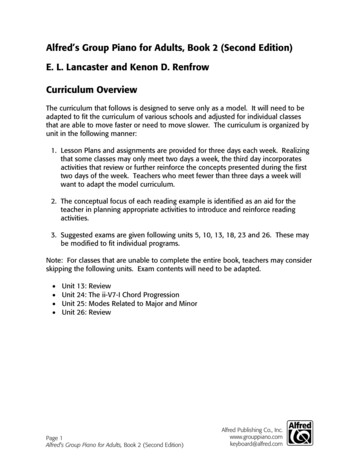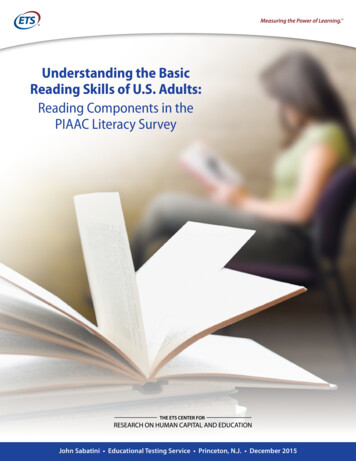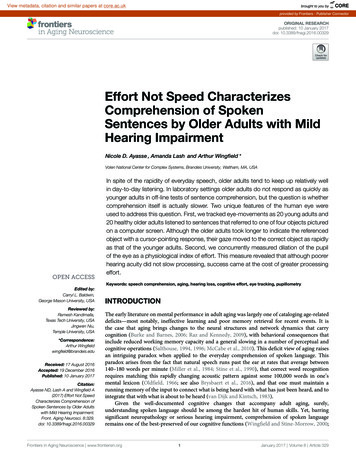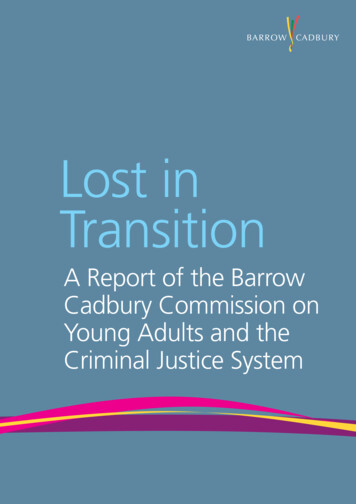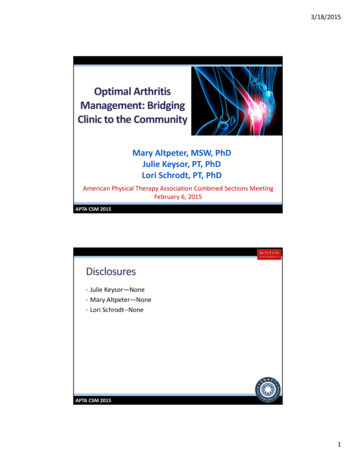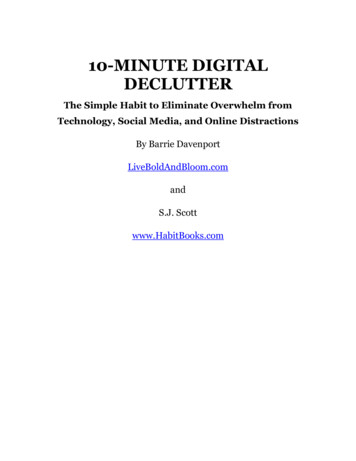
Transcription
Academic CatalogRichmond CampusPreparing today’sworking adultsto compete andthrive in a changingglobal economy.Volume 45Effective January 1, 2012through June 30, 2012
2012UNIVERSITY OF PHOENIXRICHMONDACADEMIC CATALOGVolume 45January 1, 2012 through June 30, 2012 catalogwith Addendum, Effective May 1, 2012“As we move to meet the educational needs of working adults in a mobile society, our conception of the university must extendbeyond place and embrace process. An adult university cannot be campus bound, rather its borders must be defined by thelives of its students.”Dr. John G. SperlingFounder andChairman of theBoard
Information contained in this catalog is subject to change at the discretion of the University of Phoenix without prior notification.Unless specifically stated otherwise in a particular Catalog policy, in the event of any inconsistency or conflict between theinformation contained in this catalog and any other material, the information contained in the catalog shall take precedence.The University of Phoenix is not responsible for information or claims made by individuals not affiliated with the Universitythat is contrary to University of Phoenix published material.Annual Security Report NoticeThe University of Phoenix annual security report includes statistics for the previous three years concerning reported crimesthat occurred on campus, in certain off-campus buildings or property owned or controlled by the University, and on publicproperty within, or immediately adjacent to and accessible from, the campus. The report also includes the sex offender registry, institutional policies concerning alcohol and drug use, crime prevention, the reporting of crimes, sexual assault, andother related matters. You can obtain a copy of this report by contacting your local Campus Security Authority or by accessing the followingWeb site: http://www.phoenix.edu/safety.University of Phoenix is a private institution of higher learning founded in Phoenix, Arizona in 1976. The university isaccredited by The Higher Learning Commission and is a member of the North Central Association on.org). State Council of Higher Education for Virginia has certified University of Phoenix to offer degree or certificate programs. Any course, degree or certificate program offered has beenapproved by the University of Phoenix governing board. Credit earned for course work in Virginia can be transferredto University of Phoenix's principal location outside Virginia as part of the University's existing degree or certificateprograms. 2001,2002 University of Phoenix.ALL RIGHTS RESERVED.
.ADDENDUM - NEW PROGRAM APPROVED.The following program(s) is(are) approved to be offered effectiveMay 1, 2012. Please see the program description(s), course requirements, required courses, additional course descriptions and anyother programmatic requirements listed below.Bachelor of Science in Information Technology.The following Bachelor of Science in Information Technology (BSIT)program is approved to be offered at these University of Phoenix campuslocations: Richmond. The availability of programs and concentrationsdepend on student demand and other factors. Students may want toconsider completing certain courses in the Online classroom at Onlinerates if the program is available via the Online modality in their state.Please contact your enrollment advisor for more information.The Bachelor of Science in Information Technology (BSIT) programis focused on the acquisition of theory and application of technicalcompetencies associated with the information technology profession. The courses prepare students with fundamental knowledge incore technologies, such as systems analysis and design, programming, database design, network architecture and administration,Web technologies and application development, implementationand maintenance.Courses requiring prerequisites are identified by a symbol following the course number.A Track Required Introductory CourseGEN 200 . 3 creditsFoundations for General Education and Professional SuccessB Track Required Introductory CourseGEN 195. 3 creditsFoundations of University StudiesBSIT Required Course of Study - A Track and B TrackCIS 207 . 3 creditsInformation Systems FundamentalsPRG 211 . 3 creditsAlgorithms and Logic for Computer ProgrammingWEB 240 . 3 creditsWeb Design FundamentalsPOS 355 . 3 creditsIntroduction to Operating SystemsENG 221 . 3 creditsTechnical Writing FundamentalsBSA 310 . 3 creditsBusiness SystemsBSA 375 . 3 creditsFundamentals of Business Systems DevelopmentCMGT 410 . 3 creditsProject Planning & ImplementationDBM 380 . 3 creditsDatabase ConceptsCMGT 400 . 3 creditsIntro to Information Assurance & SecurityNTC 362 . 3 creditsFundamentals of NetworkingPRG 420 .3 creditsJava Programming IMTH 221 .3 creditsDiscrete Math for ITCMGT 445 .3 creditsApplication ImplementationConcentration in Advanced NetworkingFor more information about our graduation rates, the median debtof students who completed the program, and other importantinformation, please visit our website at http://www.phoenix.edu/programs/bsit-an.NTC 405 .3 creditsTelecommunications and Networking INTC 406 .3 creditsTelecommunications and Networking IINTC 409 .3 creditsGlobal Network Architecture and DesignNTC 411 .3 creditsGlobal Network Management, Support and SecurityNTC 415 .3 creditsNetwork Integration ProjectConcentration in Business Systems AnalysisFor more information about our graduation rates, the median debtof students who completed the program, and other importantinformation, please visit our website at http://www.phoenix.edu/programs/bsit-bsa.BSA 400 .3 creditsBusiness Systems Development IIBSA 411 .3 creditsSystems Analysis MethodologiesBSA 412 .3 creditsSystems Analysis ToolsCMGT 411 .3 creditsProject Planning ManagementCMGT 413 .3 creditsApplication Acquisition & SourcingConcentration in Information ManagementFor more information about our graduation rates, the median debtof students who completed the program, and other importantinformation, please visit our website at http://www.phoenix.edu/programs/bsit-im.IM 300 .3 creditsData Organization ArchitectureIM 305 .3 creditsData ModelingPOS 410 .3 creditsSQL for BusinessDBM 384 .3 creditsSpecial Purpose DatabasesDBM 460 .3 creditsEnterprise Database Management SystemsAddendum
University of Phoenix, 2012Concentration in Web DevelopmentGeneral Education Requirements for the BSITFor more information about our graduation rates, the median debtof students who completed the program, and other importantinformation, please visit our website at http://www.phoenix.edu/programs/bsit-wd.VCT 300 . 3 creditsImage EditingWEB 401 . 3 creditsWeb DevelopmentWEB 407 . 3 creditsAdvanced Web DevelopmentWEB 434 . 3 creditsWebsite Commercialization IWEB 435 . 3 creditsWebsite Commercialization IIThe University reserves the right to modify the required course ofstudy.Additional Admission Requirements for the BSITA minimum of 54 of the 120 credits must be in the general education areas approved by the University.Communication Arts Requirement 6 credits(A Track must include COMM 215, equivalent, or higher and COMM218)(B Track must include: COM 170 and COM 172)Mathematics Requirement 6 credits(Must include MTH 220, equivalent, or higher)Science & Technology Requirement 6 credits(B Track must include: SCI 163)Must include at least three (3) credits in the physical or biological sciencesHumanities Requirement 6 credits(B Track must include: HUM 114)Social Science Requirement 6 credits(B Track must include: PSY 211)Additional Liberal Arts Requirement 6 credits(B Track must include COMM 218)Interdisciplinary Requirement 18 credits(B Track must include: FP 120)All applicants are expected to meet the following admissionsrequirements: High school graduation from an institution that holds stateapproval to confer high school diplomas or are accredited or acandidate for accreditation at the time the student attended byan acceptable accrediting body, GED certificate or CHSPE(California High School Proficiency Examination) certificate. Applicants must be currently employed or have access to a workenvironment.Degree Requirements for the BSIT Completion of a minimum of 120 credits that include thefollowing distribution: A minimum of 42 upper division credits. A minimum of 54 credits of the 120 credits must be in thegeneral education areas approved by the University. A minimum grade point average (GPA) of 2.0. All students must complete the minimum number of creditsrequired by their degree program. All undergraduate students are required to complete theminimum general education credits required by their programversion. Students will declare a concentration at the time of enrollment. The diploma awarded for this program will read as:Bachelor of Science in Information Technology and will notreflect the concentration. Concentrations are reflected on thetranscript only.AddendumAcademic Progression Requirements for the BSIT All students entering undergraduate degree programs who listless than 24 previous college credits as recognized by theuniversity on the admissions application will be enrolled in theB Track and are required to complete the First-Year Sequence. First-Year Sequence students must satisfy all seven (7) coursesfrom the First-Year Sequence prior to enrolling in any otherGeneral Education, elective, or concentration courses. GEN 195 will be required as the first course in the First-YearSequence. HUM 114 will be required as the last course in the First-YearSequence. All other FYS requirements must be satisfied prior toenrolling in any other program applicable course. With the exception of GEN 195, FP 120, and HUM 114, courserequirements may be satisfied by any of the following means: University of Phoenix coursework, Regionally or nationally accredited coursework (C- or highergrade), University of Phoenix Prior Learning Assessment, (30 creditlimit on experiential learning; 30 credit limit on professionaltraining), National Testing Programs, and ACE evaluated Military credits. The course used to satisfy a First-Year Sequence course mustbe comparable in content and credits to the Universitycourse it is replacing and must be an equivalent level orhigher level course.
University of Phoenix, 2012ADDENDUM - NEW PROGRAM APPROVED Concurrent enrollment is prohibited during any of the courses inthe First-Year Sequence. Students who list 24 or more previous college credits, asrecognized by the university on the admissions application,must take GEN 200 Foundations for General Education andProfessional Success as the first course with University ofPhoenix and are not required to enroll in the First-Year Sequence(A Track). Students who list 24 or more previous college credits, asrecognized by the University on the admissions application, andwho do not enroll in the First-Year Sequence, may not enroll inany course from the First Year Sequence to satisfy programmaticprerequisites, general education or elective requirements. Students who previously completed GEN 101, GEN 200, or GEN300 and choose to transition to the First-Year Sequence are notrequired to take GEN 195. Students may not complete any of the First-Year Sequencecourses via Directed Study. Many courses in the Required Course of Study build on orreinforce each other. To ensure that students have the requisiteskills for specific coursework certain program areas must besatisfied before students can progress to others. All undergraduate students must satisfy math and Englishprerequisites prior to enrolling in any course that requires mathor English as a prerequisite.Residency Requirements and Course Waivers for the BSITStudents must meet the established University residency requirement for degree conferral. The University requires that the majorityof coursework, 30 credits from a combination of the RequiredCourse of Study, General Education, and Electives must be completed at University of Phoenix.Students in this program may waive a maximum of 30 credits fromtheir required course of study on the basis of regionally orapproved nationally accredited transferable coursework.In order to be granted a waiver for a course in the required courseof study, the student must have completed a previous course whichmeets the following criteria: The course must have been completed at a regionally orapproved nationally accredited, or candidate for accreditation,college or university. The course must have been completed within the past five (5)years (ten years for MTH 221) of application to the Universitywith a grade of "C" (2.0) or better. The course must be comparable in content and credits to theUniversity course it is replacing and must be an equivalent levelor higher level course (i.e. graduate level coursework may beused to waive graduate or undergraduate coursework). Coursedescriptions must be included with the course waiver form inorder for the Office of Admissions and Evaluation to review thecourse waiver request.Through an approved articulation agreement, students who havesuccessfully completed equivalent courses may waive, withoutcredits, up to thirty (30) credits of the required course of study. Students must substitute other upper division coursework to satisfythe upper division credit requirement of their degree program. Thispolicy also applies to upper division courses which are used to fulfill Associate of Arts degree requirements. In order to be granted awaiver, without credit, for a course in the required course of study,a student must have completed a previous course which meets thefollowing criteria: The course must have been completed and transcripted from aregionally or nationally accredited institution with which theUniversity of Phoenix has an approved articulation agreement. The course must have been completed with a grade of "C" (2.0)or better during the effective dates of the approved articulationagreement. The course must be approved through the articulationagreement and must be comparable in content and credits to theUniversity course it is replacing.The following courses in the Required Course of Study may not bewaived: GEN 195, GEN 200Students may waive, with or without credit, courses in theRequired Course of Study, but must substitute with any upperdivision coursework to satisfy the required course of study(national testing program credit, prior learning credit, and militarycredit, or General Education coursework, may not be used toreplace coursework waived, with or without credit).Course Descriptions for the BSITGEN 200.3 creditsFoundations for General Education and Professional SuccessThis general education course is designed to introduce the intentional learner to communication, collaboration, information utilization, critical thinking, problem solving and professionalcompetence and values. The course uses an interdisciplinaryapproach for the learner to develop personal, academic strategiesin order to reach desired goals and achieve academic success.GEN 195.3 creditsFoundations of University StudiesThe essential information, skills, tools, and techniques necessaryfor academic success and personal effectiveness at the University ofPhoenix are introduced in this course. The course develops andapplies practical knowledge and skills immediately relevant tofirst-year university students. Course topics include goal settingand working with personal motivation, understanding and usingUniversity resources, developing efficient study habits, making themost of personal learning styles, and how best to manage time andreduce personal stress levels.CIS 207 .3 creditsInformation Systems FundamentalsThis course introduces the fundamentals of computer systems andthe role of information processing in today's business environment.An overview is presented of information systems, systems development, operating systems and programming, database management, networking and telecommunications, and the Internet.PRG 211 .3 creditsAlgorithms and Logic for Computer ProgrammingThis course provides students with a basic understanding of programming development practices. Concepts covered include theapplication of algorithms and logic to the design and developmentof computer programs to address the problem solving requirements associated with business information systems. This coursewill cover procedural programming concepts including data types,controls structures, functional decomposition, arrays, and files.Addendum
University of Phoenix, 2012WEB 240 . 3 creditsWeb Design FundamentalsThis course introduces development tools and techniques used topublish Web pages on the World Wide Web. Students use basichypertext markup language, scripting and presentational technologies to create web sites without the aid of a software authoringapplication. Topics include XHTML, CSS, JavaScript, server hosting, site publication, site maintenance and Search Engine Optimization.POS 355 . 3 creditsIntroduction to Operating SystemsThis course is an introduction to operating system concepts, whichinclude process, memory, file, and network management. Bothmainframe and desktop operating systems are used as illustrativeexamples.ENG 221 . 3 creditsTechnical Writing FundamentalsThis course covers the fundamentals and best practices of usingwritten communication in business and in the information technologies. Topics include strategies, techniques, and nuances for producing emails, memos, reports, proposals, project specifications,and user manuals, as well as other technical documents.BSA 310 . 3 creditsBusiness SystemsThis course reviews common business systems and their interrelationships. Business systems covered include finance, accounting,sales, marketing, human resources, legal and operations. Emphasisis placed upon the inputs and outputs of information systems andthe potential for integration of the systems.BSA 375 . 3 creditsFundamentals of Business Systems DevelopmentThis course introduces the logical and design considerationsaddressed during system and application software development. Itprovides a solid background in information systems analysis anddesign techniques through a combination of theory and application. Systems Development Life Cycle (SDLC) will be fundamentalto the course.CMGT 410. 3 creditsProject Planning and ImplementationThis course provides the foundation for understanding the broadconcepts of successful planning, organization and implementationwithin a technical environment. The course uses real-world examples and identifies common mistakes and pitfalls in project management. Topics covered include project scoping, estimating,scheduling, budgeting, tracking and controlling.DBM 380. 3 creditsDatabase ConceptsThis course covers database concepts. Topics include data analysis,the principal data models with emphasis on the relational model,entity-relationship diagrams, logical design, data administrationand normalization. The course uses Microsoft Visio.CMGT 400. 3creditsIntro to Information Assurance & SecurityThis course is an introduction to information assurance and security in computing technology. Topics include risk management;protecting information in the enterprise; business continuity anddisaster recovery planning; threats and remediation; legal, ethical,and professional issues; and considerations within systems development processes.AddendumNTC 362 . 3 creditsFundamentals of NetworkingNTC 362 provides a foundation in the basic Telecommunicationstechnologies fundamental to the industry and to the broad field oftelecommunications. Analog, digital, and radio frequency technologies are covered. Also covered in this course is an introduction tothe OSI protocol model, network-switching systems, basics ofwireless communications and network security.PRG 420. 3 creditsJava Programming IThis course introduces object-oriented programming in the contentof business applications development. The basics of the Java programming language are covered.MTH 221 . 3 creditsDiscrete Math for Information TechnologyDiscrete (as opposed to continuous) mathematics is of directimportance to the fields of Computer Science and InformationTechnology. This branch of mathematics includes studying areassuch as set theory, logic, relations, graph theory, and analysis ofalgorithms. This course is intended to provide students with anunderstanding of these areas and their use in the field of Information Technology.CMGT 445. 3 creditsApplication ImplementationThis course will cover the process and issues associated with theimplementation of a computer application information system.Topics will include the processes associated sponsor and stakeholder approvals, end user training, technical staff training, conversion from existing application(s) and integration into theinformation system production environment. This course will alsoexamine the use of development and testing environments and thetesting procedures related to the implementation of a computerapplication information system.COMM 215 . 3 creditsEssentials of College WritingThis course covers the essential writing skills required for collegelevel coursework. Students will learn to distinguish between interpretive and analytical writing while using the writing process andspecific rhetorical strategies to develop position and persuasionessays and a case study analysis, and learning teams will preparean applied research paper. The course offers exercises for review ofthe elements of grammar, mechanics, style, citation, and properdocumentation.MTH 220 . 3 creditsCollege AlgebraThis course presents traditional concepts in college algebra. Topicsinclude linear, polynomial, rational, radical, exponential and logarithmic functions, systems of equations, sequences, series, andprobability.MTH 221 . 3 creditsDiscrete Math for Information TechnologyDiscrete (as opposed to continuous) mathematics is of directimportance to the fields of Computer Science and InformationTechnology. This branch of mathematics includes studying areassuch as set theory, logic, relations, graph theory, and analysis ofalgorithms. This course is intended to provide students with anunderstanding of these areas and their use in the field of Information Technology.
University of Phoenix, 2012ADDENDUM - NEW PROGRAM APPROVEDGEN 101. 3 creditsSkills for Lifelong LearningThis course is designed to provide core competencies for adultlearners. The course examines learning theory and the applicationof adult learning principles to communication skills, group processes, and personal management. Adult learners will developstrategies for achieving University of Phoenix Learning Goals inschool, work, and personal settings. They will also be introduced tothe University Library and learn how to access resources successfully.GEN 300. 3 creditsSkills for Professional DevelopmentThis course examines the skills necessary for successful criticalthinking, teamwork, research, and communication. The course isdesigned to aid adult learners in acquiring and improving the corecompetencies that are necessary at the University of Phoenix. Students will examine their reasons for returning to school, anddevelop strategies for achieving educational goals in school, work,and personal settings. Students will also be introduced to the University library and learn how to access its resources successfully.Course Descriptions for the Concentration in Advanced NetworkingNTC 405 . 3 creditsTelecommunications and Networking INTC 405 is designed to provide the learner with the fundamentalsof DC and AC circuits, analog circuits and concepts such as amplifiers, filters, and modulation/demodulation concepts and applications. The basics of digital circuits and digital logic concepts andcircuits are analyzed. Complex digital equipment such as multiplexers are introduced. The course is completed with an analysisand application of various network topologies and network operating systems.NTC 406 . 3 creditsTelecommunications and Networking IINTC 406 provides analysis of the seven levels of the OSI model asthe basis for analysis and discussion of network protocols. Eachlevel of the OSI model is analyzed in detail with the related theorybeing applied to specific applications in the industry.NTC 409 . 3 creditsGlobal Network Architecture and DesignThis course addresses the fundamentals of network design andanalysis with an emphasis on network traffic. The network designtechniques necessary for LAN and WAN implementations are covered. The concept of serv
University of Phoenix is a private institution of higher learning founded in Phoenix, Arizona in 1976. The university is . Course of Study, General Education, and Electives must be com-pleted at University of Phoenix. Students in this program may waiv e a maximum of 30 credits from
